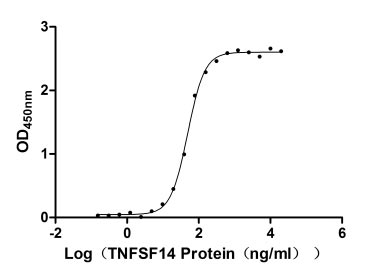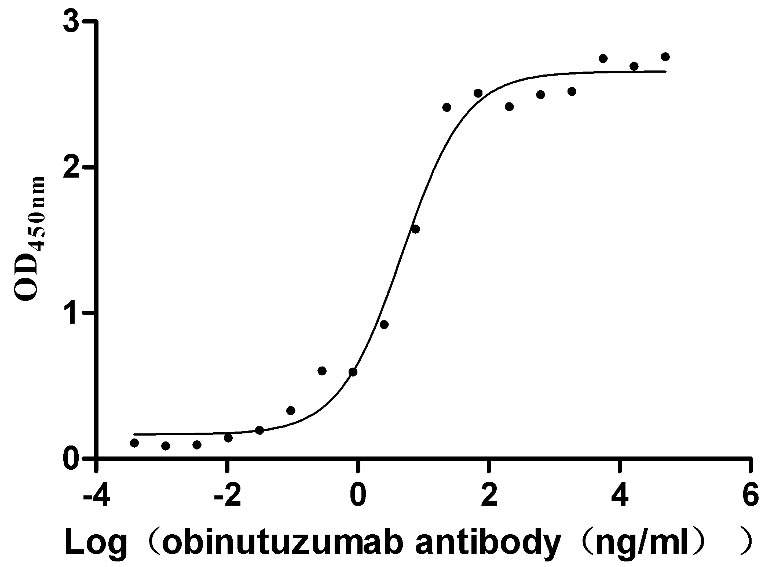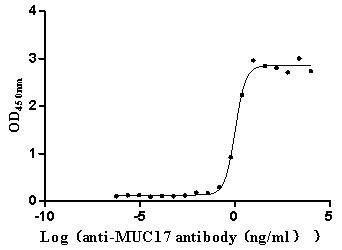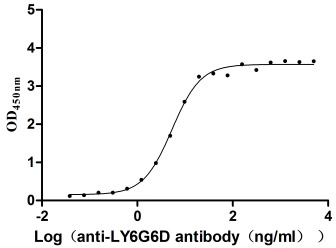Recombinant Human Retinol-binding protein 1 (RBP1)
-
货号:CSB-YP019480HU
-
规格:
-
来源:Yeast
-
其他:
-
货号:CSB-EP019480HU
-
规格:
-
来源:E.coli
-
其他:
-
货号:CSB-EP019480HU-B
-
规格:
-
来源:E.coli
-
共轭:Avi-tag Biotinylated
E. coli biotin ligase (BirA) is highly specific in covalently attaching biotin to the 15 amino acid AviTag peptide. This recombinant protein was biotinylated in vivo by AviTag-BirA technology, which method is BriA catalyzes amide linkage between the biotin and the specific lysine of the AviTag.
-
其他:
-
货号:CSB-BP019480HU
-
规格:
-
来源:Baculovirus
-
其他:
-
货号:CSB-MP019480HU
-
规格:
-
来源:Mammalian cell
-
其他:
产品详情
-
纯度:>85% (SDS-PAGE)
-
基因名:RBP1
-
Uniprot No.:
-
别名:Cellular retinol binding protein; Cellular retinol-binding protein; Cellular retinol-binding protein I; CRABP I; CRBP; CRBP-I; CRBP1; CRBPI; RBP 1; RBP1; RBPC; RET1_HUMAN; Retinol binding protein 1 cellular; Retinol-binding protein 1
-
种属:Homo sapiens (Human)
-
蛋白长度:Full Length
-
表达区域:1-135
-
氨基酸序列MPVDFTGYWK MLVNENFEEY LRALDVNVAL RKIANLLKPD KEIVQDGDHM IIRTLSTFRN YIMDFQVGKE FEEDLTGIDD RKCMTTVSWD GDKLQCVQKG EKEGRGWTQW IEGDELHLEM RVEGVVCKQV FKKVQ
-
蛋白标签:Tag type will be determined during the manufacturing process.
The tag type will be determined during production process. If you have specified tag type, please tell us and we will develop the specified tag preferentially. -
产品提供形式:Lyophilized powder
Note: We will preferentially ship the format that we have in stock, however, if you have any special requirement for the format, please remark your requirement when placing the order, we will prepare according to your demand. -
复溶:We recommend that this vial be briefly centrifuged prior to opening to bring the contents to the bottom. Please reconstitute protein in deionized sterile water to a concentration of 0.1-1.0 mg/mL.We recommend to add 5-50% of glycerol (final concentration) and aliquot for long-term storage at -20℃/-80℃. Our default final concentration of glycerol is 50%. Customers could use it as reference.
-
储存条件:Store at -20°C/-80°C upon receipt, aliquoting is necessary for mutiple use. Avoid repeated freeze-thaw cycles.
-
保质期:The shelf life is related to many factors, storage state, buffer ingredients, storage temperature and the stability of the protein itself.
Generally, the shelf life of liquid form is 6 months at -20°C/-80°C. The shelf life of lyophilized form is 12 months at -20°C/-80°C. -
货期:Delivery time may differ from different purchasing way or location, please kindly consult your local distributors for specific delivery time.Note: All of our proteins are default shipped with normal blue ice packs, if you request to ship with dry ice, please communicate with us in advance and extra fees will be charged.
-
注意事项:Repeated freezing and thawing is not recommended. Store working aliquots at 4°C for up to one week.
-
Datasheet :Please contact us to get it.
相关产品
问答及客户评论
We are interested in retinol binding protein (human) full-length. Without tags, without sodium azide and we would like it lyophilized. Can you provide this request?
1.Regarding the protein without sodium azide, there is no problem, all of our proteins don't contain any sodium azide.
2.But as for the no tag protein, we can have a try but we can't guarantee.
Please remark your requirement for tag removal if you need the untagged protein or tag removal when placing the order. We can try enzyme digestion, but we can't guarantee 100% successfully.The overall success rate of enzyme digestion data analysis is 75%-86%.
Not all protein tags can be removed as some proteins will be very unstable after tag removal.
If we succeed in removing the tag, we will charge for extra cost.
If we fail in removing the tag, we won’t charge for tag removal fees and provide the fusion protein, and remark this information in datasheet as follows
“Note: The laboratory determined that the Tag on your protein could not be removed with standard laboratory procedures. Your protein is being supplied with the Tag intact.”
Generally, the delivery time will be extended for 3 days.
3.We can provide lyophilization service for free, lead time will be extended for 3 working days, please be noted that we will add 6% trehalose added as the protective agent during the lyophilization. Please check if this is OK for you.
靶点详情
-
功能:Cytoplasmic retinol-binding protein. Accepts retinol from the transport protein STRA6, and thereby contributes to retinol uptake, storage and retinoid homeostasis.
-
基因功能参考文献:
- Low CRBP1 expression is associated with low radiation sensitivity in rectal cancer. PMID: 28291773
- This conformational flexibility of human apo-CRBP1 facilitates interaction with the ligands, whereas the more rigid holoprotein structure protects the labile retinoid moiety during vitamin A transport. PMID: 26900151
- Hypermethylation of CRBP1 gene is associated with Epstein-Barr virus-associated gastric carcinomas. PMID: 25720522
- Further studies are needed to explore new therapeutic strategies aimed at restoring CRBP-1-mediated intracellular retinol trafficking and the meaning of CRBP-1 expression in cancer patients screening for a more personalized and efficacy retinoid therapy PMID: 25879031
- RBP1 expression was reduced in tissue and endometrial stromal cells derived from endometritis lesions versus eutopic endometruim in humans and mice. PMID: 25143356
- Functional hepatic stellate cells coexpressing both LRAT and CRBP-1, that continue to maintain the ability to store vitamin A, contribute in part to the development of portal and parenchymal fibrogenesis in patients with viral hepatitis. PMID: 23890161
- Factors involved in the retinoid pathway, in particular upregulation of CRBP, CRABP1 and CRABP2, also showed differential expression in tumors with different histological subtypes PMID: 24269351
- CRBP-1 loss in G2/G3 ovarian carcinomas and increased apoptotic susceptibility to retinoids. PMID: 24982334
- Suggest CRBP1 gene as a tumor suppressor gene for cervical cancer. PMID: 24040446
- High urine retinol binding protein is associated with interstitial fibrosis and tubular atrophy plus inflammation. PMID: 23414180
- RBP1 promoter hypermethylation is found in nearly all IDH1 and IDH2 mutant gliomas Because RBP1 is involved in retinoic acid synthesis, results suggest that dysregltion of RA metabolism may contribute to glioma formation along the IDH1/IDH2-mutant pathway PMID: 22945948
- CRBP-1 plays a role in ventricular remodeling after myocardial infarction allegedly through its RA binding activity. PMID: 22449228
- Increased expression and unmethylated promoter of the CRBP1 gene could be considered as markers for larynx cancer. PMID: 22049223
- Data show that CRBPI and CRBPII bind 9-cis-retinol and 9-cis-retinal with high affinities, albeit with affinities somewhat lower than for all-trans-retinol and all-trans-retinal. PMID: 21382444
- STRA6 not only is a vitamin A transporter but also is a cell-surface signaling receptor activated by the RBP-retinol complex. PMID: 21368206
- CRBP1 gene could have a tumor suppressive function in bladder cancer. PMID: 21042705
- It is likely that mutations in RGR, RBP3, and possibly RBP1 occur rarely in inherited retinal dystrophies. PMID: 21067480
- protein-ligand interaction differences between CRBP-I and CRBP-II PMID: 19965581
- a high CRBP-1 expression is associated with smooth muscle malignancy and suggest that CRBP-1 expression represents a new useful marker for the classification of unusual variants of smooth muscle tumors PMID: 12111198
- CRBP1 has a role in vitamin A metabolism and its absence may play a role in ovarian cancer oncogenesis PMID: 12631600
- may serve as a surrogate marker for graft dysfunction early after kidney transplantation PMID: 12826154
- in liver cancer modulation of CRBP-1 expression in HCCs contributes to tumor growth and progression via retinoid-mediated signaling and disruption of cellular vitamin A homeostasis. PMID: 12883492
- Colocalization of plasma retinol-binding protein with RPE65 and affinity binding suggest a direct interaction of RPE65 with plasma retinol-binding protein in cultured human keratinocytes that might be involved in retinoid uptake of keratinocytes. PMID: 15009723
- in fibrotic or cirrhotic liver, the different patterns of expression for CRBP-1 and alpha-SMA allow the distinction of different subsets of fibroblastic cells involved in fibrogenesis and septa formation PMID: 15094224
- CRBP-I downregulation in cancer promotes tumor progression through inhibition of retinoic acid receptor activity and derepression of PI3K/Akt signaling via a novel mechanism. PMID: 15608670
- The widely expressed CRBP1, which binds all-trans-retinol with much higher affinity than all-trans-retinaldehyde, restricts the oxidation of all-trans-retinol by retinol dehydrogenase 12 but has little effect on the reduction of all-trans-retinaldehyde. PMID: 15865448
- CRBP-1+ cells increased in squamous intraepithelial lesions and slightly decreased in invasive squamous cell carcinomas. PMID: 17593084
- Retinoic acid and retinol regulate expression of cellular retinol binding protein 1 and cellular RA binding protein 2 in fibroid and myometrial cells. PMID: 18343808
- CRBP-1 clearly stains liver lobular HSCs without reacting with smooth muscle cells (SMCs) and shows variable cholangiocyte p PMID: 19052772
- Methylation of CLDN6, FBN2, RBP1, RBP4, TFPI2, and TMEFF2 in esophageal squamous cell carcinoma. PMID: 19288010
显示更多
收起更多
-
亚细胞定位:Cytoplasm. Lipid droplet.
-
蛋白家族:Calycin superfamily, Fatty-acid binding protein (FABP) family
-
组织特异性:Detected in nearly all the tissues with higher expression in adult ovary, pancreas, pituitary gland and adrenal gland, and fetal liver.
-
数据库链接:
HGNC: 9919
OMIM: 180260
KEGG: hsa:5947
STRING: 9606.ENSP00000232219
UniGene: Hs.529571
Most popular with customers
-
Recombinant Human Tumor necrosis factor ligand superfamily member 14 (TNFSF14), partial (Active)
Express system: Mammalian cell
Species: Homo sapiens (Human)
-
Recombinant Human Tumor necrosis factor ligand superfamily member 8 (TNFSF8), partial (Active)
Express system: Mammalian cell
Species: Homo sapiens (Human)
-
Recombinant Human B-lymphocyte antigen CD20 (MS4A1)-VLPs (Active)
Express system: Mammalian cell
Species: Homo sapiens (Human)
-
Recombinant Human C-X-C chemokine receptor type 4 (CXCR4)-VLPs (Active)
Express system: Mammalian cell
Species: Homo sapiens (Human)
-
Recombinant Human Mucin-17 (MUC17), partial (Active)
Express system: Mammalian cell
Species: Homo sapiens (Human)
-
Recombinant Human Claudin-6 (CLDN6)-VLPs, Fluorescent (Active)
Express system: Mammalian cell
Species: Homo sapiens (Human)
-
Recombinant Human Dickkopf-related protein 1 (DKK1) (Active)
Express system: Mammalian cell
Species: Homo sapiens (Human)
-
Recombinant Macaca fascicularis lymphocyte antigen 6 family member G6D (LY6G6D) (Active)
Express system: Yeast
Species: Macaca fascicularis (Crab-eating macaque) (Cynomolgus monkey)





-AC1.jpg)

f4-AC1.jpg)
-AC1.jpg)











